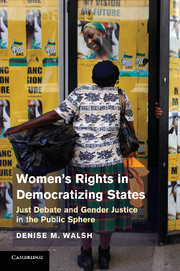Book contents
- Frontmatter
- Contents
- List of Figures and Tables
- Acknowledgments
- Abbreviations
- PART I JUST DEBATE
- PART II JUST DEBATE IN DEMOCRATIZING STATES
- 4 Just Debate Denied: Socialist and Post-socialist Poland
- 5 Just Debate Diverges: Regime Breakdown in Chile and South Africa
- 6 Just Debate Prevails: The Liberal Moment in South Africa
- 7 Just Debate Declines: Consolidation in South Africa
- PART III GENDER JUSTICE
- Bibliography
- Index
6 - Just Debate Prevails: The Liberal Moment in South Africa
Published online by Cambridge University Press: 06 December 2010
- Frontmatter
- Contents
- List of Figures and Tables
- Acknowledgments
- Abbreviations
- PART I JUST DEBATE
- PART II JUST DEBATE IN DEMOCRATIZING STATES
- 4 Just Debate Denied: Socialist and Post-socialist Poland
- 5 Just Debate Diverges: Regime Breakdown in Chile and South Africa
- 6 Just Debate Prevails: The Liberal Moment in South Africa
- 7 Just Debate Declines: Consolidation in South Africa
- PART III GENDER JUSTICE
- Bibliography
- Index
Summary
“… freedom cannot be achieved unless women have been emancipated from all forms of oppression.”
Nelson MandelaINTRODUCTION
South Africa has become a paradigmatic site for investigating how and why advances in women's rights occur in democratizing states. As discussed in the previous chapter, during the years immediately prior to the first nonracial election, advocates won important commitments to women's rights from the ANC, as well as new legislation from the apartheid regime. Surprisingly, after the 1994 elections, these advances continued. The government ratified CEDAW in 1995. It addressed women's inequitable employment in the 1995 Labour Relations Act, 1997 Basic Conditions of Employment Act, the 1998 Employment Equity Act, and the 2000 Promotion of Equality and Prevention of Unfair Discrimination Act. In 1996, abortion was legalized. In 1998, the legislature passed a remarkable domestic violence bill and reformed the maintenance law and customary marriage. However, this triumphal story did not last. This series of gender reforms sputtered to an end despite continued pressing need for action. Some legislation in the new century even threatened women's gains. What accounts for this rise and stall in gender reform?
This is an unusual question for gender scholars who study democratic transitions, as advances in women's rights like those in South Africa are rare. The stall, on the other hand, is not surprising. In the end, South Africa appears to confirm what gender scholars have already established: Democratization is not associated with significant advances in women's rights.
- Type
- Chapter
- Information
- Women’s Rights in Democratizing StatesJust Debate and Gender Justice in the Public Sphere, pp. 157 - 184Publisher: Cambridge University PressPrint publication year: 2010



